#AI-driven ordering systems
Explore tagged Tumblr posts
Text
Goodbye Errors, Hello Efficiency: The AI Ordering System Advantage
Imagine your busy restaurant: the smell of the fresh dishes being prepared in the kitchen, the clinking of wine glasses, and a crowd of happy guests. Now, imagine this idyllic scene and then interrupted by a groan of diners who have been served their peanut sauce instead of pesto. Human error is inevitable, but for the restaurateur, it is one unwanted guest who can also spoil the party. That is where an AI ordering system skates in, saving the day (and your reputation) with a whisper of tech magic.
The AI Waiter That Never Gets Your Order Wrong: How Does AI Ordering Work?
AI-driven ordering systems are the restaurant superhero: they remember the tiniest detail, down to a customer's food allergies and the specific level of doneness desired in their steak, all without any use of paper and pencil. Here, machine learning helps optimize order processing, predicting and streamlining customer choice between front-of-house and back-of-house.
No more, "I didn't order this!"
Error-Free Order Taking
We have all had that moment of disappointment when the meal arriving at the table is not what was ordered. An AI-enabled ordering system is a diligent server that never mishears or mistypes an order, ensuring that every dish served is a mirror image of the customer's request.
Personalization at Its Best
This beauty in AI-driven ordering systems lies in its ability to learn from every interaction. It will remember that Mr. Smith wants extra olives on his pizza and that Mrs. Jones has a shellfish allergy. This level of personalization is not just impressive—it's how you build loyalty and return customers.
Quicker Service, Quicker Smiles
Accelerate Service Times
With AI, orders are processed so that there is no downtime between taking the order and getting it to the kitchen. The system is instantaneous-meaning starters can be nibbled while the entrees are still being prepared, not just entered into the system.
Stay on Top of Peak Hours
Your restaurant is the bomb, and Friday nights can be as busy as a theme park. Luckily, an AI-driven ordering system is your Fast Pass, keeping the orders coming and the kitchen humming, even when every table is full.
Inventory Management: The Unsung Hero of AI
Say Goodbye to Stock Surprises
With an AI-enabled ordering system, what's being ordered is constantly analyzed, so it can predict inventory needs with real-time data. So, say goodbye to that panic when you run out of salmon in the middle of service or have to 86 your top-selling dessert.
Reduce Waste
With AI fine-tuning your inventory, those overorders are a thing of the past. Waste reduction is a very effective way to reduce costs while also being fantastically good for the environment.
Huge Integrations
An Ecosystem of Efficiency
The AI-enabled ordering system plays nicely with your existing software. From payment processing to loyalty programs, and from staff scheduling to table management, AI-driven ordering systems can integrate with a multitude of applications, creating a seamless flow of information.
In Sync with Your Kitchen
An optimized kitchen is a happy kitchen, and AI-driven ordering systems ensure that with direct integration with the kitchen display screens. This ensures that orders pop up on the screens of chefs in real-time, eliminating confusion and shouting, which usually leads to mistakes.
Data-Driven Decisions
Unlocking the Power of Analytics
Every order has a story and an AI-enabled ordering system is a great narrator. Understanding buying trends, bestsellers, and dishes that need to be worked on can be understood properly only by understanding what tickles your customers' taste buds.
Customized Marketing Campaigns
With data in hand, you can design campaigns that strike the spot. Are salads a summer sellout? Is your seafood special a winter warmer? Engage your customers' favorites with the data your AI-driven ordering system collects.
Conclusion: Effortless Ordering Is Just a System Away
Mistakes are human, but in the restaurant business, they can cost you dearly. With an AI ordering system, error-laden paper tickets become a folk tale. Embrace accuracy, efficiency, and most importantly, embrace the tech that allows your staff to focus on what truly matters—crafting an unbeatable dining experience for your clientele.
Now, are you ready to gift precision to your restaurant with a touch of AI? The transition towards an eatOS AI-driven ordering system, lets your staff and your customers enjoy the innovation that serves perfection on a plate, every single time. Wait no longer, book a product demonstration with us today.
0 notes
Text
Penguin Random House, AI, and writers’ rights
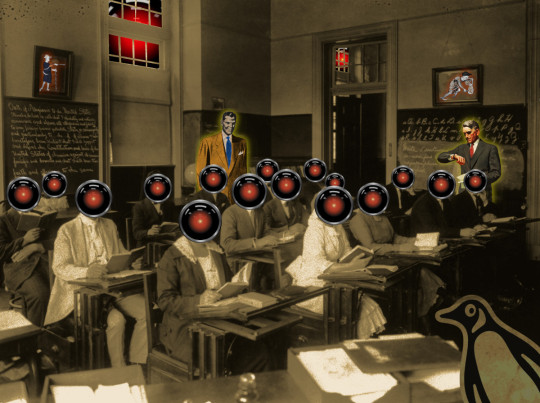
NEXT WEDNESDAY (October 23) at 7PM, I'll be in DECATUR, GEORGIA, presenting my novel THE BEZZLE at EAGLE EYE BOOKS.

My friend Teresa Nielsen Hayden is a wellspring of wise sayings, like "you're not responsible for what you do in other people's dreams," and my all time favorite, from the Napster era: "Just because you're on their side, it doesn't mean they're on your side."
The record labels hated Napster, and so did many musicians, and when those musicians sided with their labels in the legal and public relations campaigns against file-sharing, they lent both legal and public legitimacy to the labels' cause, which ultimately prevailed.
But the labels weren't on musicians' side. The demise of Napster and with it, the idea of a blanket-license system for internet music distribution (similar to the systems for radio, live performance, and canned music at venues and shops) firmly established that new services must obtain permission from the labels in order to operate.
That era is very good for the labels. The three-label cartel – Universal, Warner and Sony – was in a position to dictate terms like Spotify, who handed over billions of dollars worth of stock, and let the Big Three co-design the royalty scheme that Spotify would operate under.
If you know anything about Spotify payments, it's probably this: they are extremely unfavorable to artists. This is true – but that doesn't mean it's unfavorable to the Big Three labels. The Big Three get guaranteed monthly payments (much of which is booked as "unattributable royalties" that the labels can disperse or keep as they see fit), along with free inclusion on key playlists and other valuable services. What's more, the ultra-low payouts to artists increase the value of the labels' stock in Spotify, since the less Spotify has to pay for music, the better it looks to investors.
The Big Three – who own 70% of all music ever recorded, thanks to an orgy of mergers – make up the shortfall from these low per-stream rates with guaranteed payments and promo.
But the indy labels and musicians that account for the remaining 30% are out in the cold. They are locked into the same fractional-penny-per-stream royalty scheme as the Big Three, but they don't get gigantic monthly cash guarantees, and they have to pay the playlist placement the Big Three get for free.
Just because you're on their side, it doesn't mean they're on your side:
https://pluralistic.net/2022/09/12/streaming-doesnt-pay/#stunt-publishing
In a very important, material sense, creative workers – writers, filmmakers, photographers, illustrators, painters and musicians – are not on the same side as the labels, agencies, studios and publishers that bring our work to market. Those companies are not charities; they are driven to maximize profits and an important way to do that is to reduce costs, including and especially the cost of paying us for our work.
It's easy to miss this fact because the workers at these giant entertainment companies are our class allies. The same impulse to constrain payments to writers is in play when entertainment companies think about how much they pay editors, assistants, publicists, and the mail-room staff. These are the people that creative workers deal with on a day to day basis, and they are on our side, by and large, and it's easy to conflate these people with their employers.
This class war need not be the central fact of creative workers' relationship with our publishers, labels, studios, etc. When there are lots of these entertainment companies, they compete with one another for our work (and for the labor of the workers who bring that work to market), which increases our share of the profit our work produces.
But we live in an era of extreme market concentration in every sector, including entertainment, where we deal with five publishers, four studios, three labels, two ad-tech companies and a single company that controls all the ebooks and audiobooks. That concentration makes it much harder for artists to bargain effectively with entertainments companies, and that means that it's possible -likely, even – for entertainment companies to gain market advantages that aren't shared with creative workers. In other words, when your field is dominated by a cartel, you may be on on their side, but they're almost certainly not on your side.
This week, Penguin Random House, the largest publisher in the history of the human race, made headlines when it changed the copyright notice in its books to ban AI training:
https://www.thebookseller.com/news/penguin-random-house-underscores-copyright-protection-in-ai-rebuff
The copyright page now includes this phrase:
No part of this book may be used or reproduced in any manner for the purpose of training artificial intelligence technologies or systems.
Many writers are celebrating this move as a victory for creative workers' rights over AI companies, who have raised hundreds of billions of dollars in part by promising our bosses that they can fire us and replace us with algorithms.
But these writers are assuming that just because they're on Penguin Random House's side, PRH is on their side. They're assuming that if PRH fights against AI companies training bots on their work for free, that this means PRH won't allow bots to be trained on their work at all.
This is a pretty naive take. What's far more likely is that PRH will use whatever legal rights it has to insist that AI companies pay it for the right to train chatbots on the books we write. It is vanishingly unlikely that PRH will share that license money with the writers whose books are then shoveled into the bot's training-hopper. It's also extremely likely that PRH will try to use the output of chatbots to erode our wages, or fire us altogether and replace our work with AI slop.
This is speculation on my part, but it's informed speculation. Note that PRH did not announce that it would allow authors to assert the contractual right to block their work from being used to train a chatbot, or that it was offering authors a share of any training license fees, or a share of the income from anything produced by bots that are trained on our work.
Indeed, as publishing boiled itself down from the thirty-some mid-sized publishers that flourished when I was a baby writer into the Big Five that dominate the field today, their contracts have gotten notably, materially worse for writers:
https://pluralistic.net/2022/06/19/reasonable-agreement/
This is completely unsurprising. In any auction, the more serious bidders there are, the higher the final price will be. When there were thirty potential bidders for our work, we got a better deal on average than we do now, when there are at most five bidders.
Though this is self-evident, Penguin Random House insists that it's not true. Back when PRH was trying to buy Simon & Schuster (thereby reducing the Big Five publishers to the Big Four), they insisted that they would continue to bid against themselves, with editors at Simon & Schuster (a division of PRH) bidding against editors at Penguin (a division of PRH) and Random House (a division of PRH).
This is obvious nonsense, as Stephen King said when he testified against the merger (which was subsequently blocked by the court): "You might as well say you’re going to have a husband and wife bidding against each other for the same house. It would be sort of very gentlemanly and sort of, 'After you' and 'After you'":
https://apnews.com/article/stephen-king-government-and-politics-b3ab31d8d8369e7feed7ce454153a03c
Penguin Random House didn't become the largest publisher in history by publishing better books or doing better marketing. They attained their scale by buying out their rivals. The company is actually a kind of colony organism made up of dozens of once-independent publishers. Every one of those acquisitions reduced the bargaining power of writers, even writers who don't write for PRH, because the disappearance of a credible bidder for our work into the PRH corporate portfolio reduces the potential bidders for our work no matter who we're selling it to.
I predict that PRH will not allow its writers to add a clause to their contracts forbidding PRH from using their work to train an AI. That prediction is based on my direct experience with two of the other Big Five publishers, where I know for a fact that they point-blank refused to do this, and told the writer that any insistence on including this contract would lead to the offer being rescinded.
The Big Five have remarkably similar contracting terms. Or rather, unremarkably similar contracts, since concentrated industries tend to converge in their operational behavior. The Big Five are similar enough that it's generally understood that a writer who sues one of the Big Five publishers will likely find themselves blackballed at the rest.
My own agent gave me this advice when one of the Big Five stole more than $10,000 from me – canceled a project that I was part of because another person involved with it pulled out, and then took five figures out of the killfee specified in my contract, just because they could. My agent told me that even though I would certainly win that lawsuit, it would come at the cost of my career, since it would put me in bad odor with all of the Big Five.
The writers who are cheering on Penguin Random House's new copyright notice are operating under the mistaken belief that this will make it less likely that our bosses will buy an AI in hopes of replacing us with it:
https://pluralistic.net/2023/02/09/ai-monkeys-paw/#bullied-schoolkids
That's not true. Giving Penguin Random House the right to demand license fees for AI training will do nothing to reduce the likelihood that Penguin Random House will choose to buy an AI in hopes of eroding our wages or firing us.
But something else will! The US Copyright Office has issued a series of rulings, upheld by the courts, asserting that nothing made by an AI can be copyrighted. By statute and international treaty, copyright is a right reserved for works of human creativity (that's why the "monkey selfie" can't be copyrighted):
https://pluralistic.net/2023/08/20/everything-made-by-an-ai-is-in-the-public-domain/
All other things being equal, entertainment companies would prefer to pay creative workers as little as possible (or nothing at all) for our work. But as strong as their preference for reducing payments to artists is, they are far more committed to being able to control who can copy, sell and distribute the works they release.
In other words, when confronted with a choice of "We don't have to pay artists anymore" and "Anyone can sell or give away our products and we won't get a dime from it," entertainment companies will pay artists all day long.
Remember that dope everyone laughed at because he scammed his way into winning an art contest with some AI slop then got angry because people were copying "his" picture? That guy's insistence that his slop should be entitled to copyright is far more dangerous than the original scam of pretending that he painted the slop in the first place:
https://arstechnica.com/tech-policy/2024/10/artist-appeals-copyright-denial-for-prize-winning-ai-generated-work/
If PRH was intervening in these Copyright Office AI copyrightability cases to say AI works can't be copyrighted, that would be an instance where we were on their side and they were on our side. The day they submit an amicus brief or rulemaking comment supporting no-copyright-for-AI, I'll sing their praises to the heavens.
But this change to PRH's copyright notice won't improve writers' bank-balances. Giving writers the ability to control AI training isn't going to stop PRH and other giant entertainment companies from training AIs with our work. They'll just say, "If you don't sign away the right to train an AI with your work, we won't publish you."
The biggest predictor of how much money an artist sees from the exploitation of their work isn't how many exclusive rights we have, it's how much bargaining power we have. When you bargain against five publishers, four studios or three labels, any new rights you get from Congress or the courts is simply transferred to them the next time you negotiate a contract.
As Rebecca Giblin and I write in our 2022 book Chokepoint Capitalism:
Giving a creative worker more copyright is like giving your bullied schoolkid more lunch money. No matter how much you give them, the bullies will take it all. Give your kid enough lunch money and the bullies will be able to bribe the principle to look the other way. Keep giving that kid lunch money and the bullies will be able to launch a global appeal demanding more lunch money for hungry kids!
https://chokepointcapitalism.com/
As creative workers' fortunes have declined through the neoliberal era of mergers and consolidation, we've allowed ourselves to be distracted with campaigns to get us more copyright, rather than more bargaining power.
There are copyright policies that get us more bargaining power. Banning AI works from getting copyright gives us more bargaining power. After all, just because AI can't do our job, it doesn't follow that AI salesmen can't convince our bosses to fire us and replace us with incompetent AI:
https://pluralistic.net/2024/01/11/robots-stole-my-jerb/#computer-says-no
Then there's "copyright termination." Under the 1976 Copyright Act, creative workers can take back the copyright to their works after 35 years, even if they sign a contract giving up the copyright for its full term:
https://pluralistic.net/2021/09/26/take-it-back/
Creative workers from George Clinton to Stephen King to Stan Lee have converted this right to money – unlike, say, longer terms of copyright, which are simply transferred to entertainment companies through non-negotiable contractual clauses. Rather than joining our publishers in fighting for longer terms of copyright, we could be demanding shorter terms for copyright termination, say, the right to take back a popular book or song or movie or illustration after 14 years (as was the case in the original US copyright system), and resell it for more money as a risk-free, proven success.
Until then, remember, just because you're on their side, it doesn't mean they're on your side. They don't want to prevent AI slop from reducing your wages, they just want to make sure it's their AI slop puts you on the breadline.

Tor Books as just published two new, free LITTLE BROTHER stories: VIGILANT, about creepy surveillance in distance education; and SPILL, about oil pipelines and indigenous landback.


If you'd like an essay-formatted version of this post to read or share, here's a link to it on pluralistic.net, my surveillance-free, ad-free, tracker-free blog:
https://pluralistic.net/2024/10/19/gander-sauce/#just-because-youre-on-their-side-it-doesnt-mean-theyre-on-your-side

Image: Cryteria (modified) https://commons.wikimedia.org/wiki/File:HAL9000.svg
CC BY 3.0 https://creativecommons.org/licenses/by/3.0/deed.en
#pluralistic#publishing#penguin random house#prh#monopolies#chokepoint capitalism#fair use#AI#training#labor#artificial intelligence#scraping#book scanning#internet archive#reasonable agreements
731 notes
·
View notes
Text
I watched TRON (1982) and TRON LEGACY (2010) back to back and I want to tell you what makes a TRON plot:
A counter-culture hacker has a strained relationship with the ENCOM tech company. They sit at a desk (with their back to a big laser) to poke around a computer system, then get lasered into cyberspace by a rogue intelligent program that has taken charge of its program society through militaristic cyberviolence. The hacker is briefly forced to play deathsports (video games) before fleeing into a cyberworld they don't understand, joining forces with anti-fascist cyberallies while constantly on the run, trying to get to a big glowing cyberbeam in order to get home and also defeat the rogue ai's cyberplan to spread its cybercontrol to human society. There's a cyberguy named Tron who -and this is essential- is only important to the plot once. Profit-driven tech leaders get deposed. The visuals are state-of-the-art and indulgently weird, often beautiful but also confidently overreaching their capabilities. Philosophical questions of life and meaning are raised but never explicitly explored in dialogue, though messages are ripe for extrapolating. Jeff Bridges is there and he's a pretty chill cybergod.
They should make a new one every 15 years or so forever.
184 notes
·
View notes
Text
A new visitor this morning... The Birdsy AI identified and recorded the clip. I was in a meeting and only saw it later in my Birdsy account. What a magnificent bird! Apparently it is a she, a Sharp-shinned. And she left hungry.
A word about Birdsy... I have been using their cameras since 2019, and I love the convenience of using a camera that is AI driven rather than unsing motion detection. My photo setup is motion activated, and it takes me a lot of time and computer storage to handle and edit the photos. I have used security cams to get close to wildlife before too, but I found it very time-consuming to sift through the footage to see if they captured anything fun. The cool thing with Birdsy is that the AI is trained on wildlife and captures exactly that so you do not end up with tons of “empty” videos. You also don’t have to install emulators or wonky software in order to watch your clips or livestream. With Birdsy, you get an app as well as an online account in which all your videos are saved and sorted by ID and date. And you can share your clips and livestream with others or embed it on your website, like I am doing here as well. In my opinion, nothing beats the convenience of this system as opposed to trail cams or security cams. No SD cards needed, and you are not tied to a setup like the gadgety smart feeders that seem to be all the rage now. You can build your own setup. Check it out on their website birdsy.com. I am streaming there too 😊
#birds#backyard birds#birds of prey#hawks#birds of north america#Birdsy#nature#wildlife#Ostdrossel#Friday vibes
232 notes
·
View notes
Text
futuristic dr | virelia + neovista
------------------------------------------------------------------------------
date: may 14 2025. i'm figuring out how to format this from my script so it's probably gonna look like a mess i'm sorry haha. i may edit this to add more info if i feel like it.
------------------------------------------------------------------------------



✧˖*°࿐the state
დ࿐ ˗ˋ virelia ☆ 𓂃 › official title. The Sovereign Technocratic Republic of Virelia ☆ 𓂃 › motto. “precision. progress. perfection.”
virelia represents a paradigm shift in governance — not built on ideological revolution but on technological supremacy. it emerged in the late 21st century after a coalition of corporate leaders, scientists, and futurists proposed a self-regulating state built around data-driven governance and environmental sustainability.
virelia is a beacon of technological advancement, a sprawling self-sustaining state located on the western coast of North America. founded in the late 21st century, it has quickly risen to prominence as a futuristic utopia where human ambition and technology intertwine seamlessly.
this city-state operates with cutting-edge infrastructure, clean energy solutions, and unprecedented levels of automation, making it a model of the future. however, its advancement comes with hidden costs, such as surveillance, control, and the loss of personal freedoms for some citizens.
დ࿐ ˗ˋ location. built on reclaimed land along the coast, the state is positioned near mountains, leveraging its natural terrain for sustainability. this combination of oceanfront and mountainous landscape allows for the development of a beautiful yet highly structured environment. ☆ 𓂃 › climate. Virelia enjoys mild weather and pristine air quality thanks to its advanced environmental control systems. artificial rainfall helps balance the region's climate, ensuring that both agriculture and ecosystems thrive in a sustainable way.
დ࿐ ˗ˋ security. Virelia's government promises safety and order, with AI-driven law enforcement and near-complete surveillance throughout the city. While this has reduced crime, it has also led to a society where privacy is almost nonexistent. there are whispers of corruption and a power struggle between mega-corporations and the state apparatus, but these are rarely seen by the public eye.
დ࿐ ˗ˋ infrastructure. the state boasts hyperloop systems for rapid transportation, vertical farming to maintain food supplies, solar-powered highways, and drone-based delivery networks that make logistics seamless and efficient. the city is powered by renewable energy sources, making it one of the most environmentally friendly cities on Earth.
*ೃ༄government
Virelia operates as a technocratic-republic hybrid, where leadership is shared between elected officials and influential corporate leaders, scientists, and engineers. while democracy is maintained on paper, the wealth and power held by corporations, especially megacorporations like Orbis, have a significant influence over the decision-making process.
𓂃 ࣪˖ ִֶָ☆ the core assembly. a ruling body made of 50% elected officials and 50% appointed technocrats from approved corporate, scientific, and engineering councils.
𓂃 ࣪˖ ִֶָ☆ citizen score index (CSI). citizens are ranked via a complex index measuring productivity, compliance, social behavior, and cybernetic compatibility.
𓂃 ࣪˖ ִֶָ☆ the data purity initiative. Virelia heavily regulates access to public data and surveillance feeds. those who attempt to mask or alter their data trail risk demotion in social status or even imprisonment.
დ࿐ ˗ˋ a controlled utopia. on the surface, Virelia is a utopia, offering its citizens a high standard of living, access to the latest technology, and the promise of a pollution-free environment. however, this idealized world comes at a cost—strict regulations on cybernetics, data privacy, and social freedoms. citizens are encouraged to embrace technology, but those who resist are often marginalized or silenced.





✧˖*°࿐the city
neovista is a megacity — a glittering neon spire among the clouds and an undercity of grit and rebellion. It’s a contradiction: a technological utopia resting on a foundation of exploitation and resistance.
დ࿐ ˗ˋ common mods. ocular overlays, subdermal HUDs, neural ports, smart limbs.
*ೃ༄black market and underground tech
located beneath the official grid of Neovista, in the Vein or the Undervault.
დ࿐ ˗ˋ traders deal in: ☆ 𓂃 › memory-modding tech ☆ 𓂃 › neural firewalls ☆ 𓂃 › blackbox implants ☆ 𓂃 › emotion regulators ☆ 𓂃 › discontinued weapon augmentations
hackclans (like SpiralZero or Echo Drift) operate in these markets, building custom tools to counter HALO’s surveillance net.
while Orbis Corporation and other megacorporations offer cutting-edge cybernetics, there is a thriving black market for illegal modifications and illicit technology. from hacked neural implants to stolen AI software, the underground tech scene is a dangerous place but provides an outlet for those who cannot afford or do not want to abide by the official channels.
𓂃 ࣪˖ ִֶָ☆ pirates and hackers: groups like The Shattermen exploit these underground markets, seeking to disrupt corporate control by stealing and redistributing technology. they often employ cybernetic pirates who operate outside the law, dealing in anything from illegal AI software to underground body augmentations.
*ೃ༄energy & environmental tech
𓂃 ࣪˖ ִֶָ☆ skyharbor towers: pull moisture and solar energy, creating perpetual artificial rainfall and maintaining air quality.
𓂃 ࣪˖ ִֶָ☆ cryoroot systems: bioengineered roots that store solar power and regulate temperature in city zones.
𓂃 ࣪˖ ִֶָ☆ ecozones: each district has its own energy quota; exceeding it triggers rolling blackouts in poorer sectors.
virelia is powered by renewable energy sources like solar and wind, and artificial rainfall systems maintain a stable climate. advanced energy storage technology allows the city to operate efficiently even in low-light conditions.
the city uses vertical farming and aquaponics to maintain food production in a way that integrates seamlessly into urban spaces, providing sustenance for its citizens without relying on traditional agricultural methods.
*ೃ༄transportation & infrastructure
𓂃 ࣪˖ ִֶָ☆ hyperloop arteries: Connect districts with high-speed magnetized transit tubes.
𓂃 ࣪˖ ִֶָ☆ skyrails: glass-bottomed tramways suspended between megastructures.
𓂃 ࣪˖ ִֶָ☆ drone skynet: hundreds of drones transport packages, law enforcement supplies, and emergency aid across the city.
𓂃 ࣪˖ ִֶָ☆ vertical cities: skyscrapers built as self-contained ecosystems—residential, commercial, medical, and agricultural facilities stacked together.
neovista's transportation system is revolutionary, with hyperloop networks connecting different districts, allowing for ultra-fast travel. drone-based delivery systems handle everything from groceries to medical supplies, and personal autonomous vehicles are common on the roads.
the city has designed solar-powered highways and green rooftops that house both parks and renewable energy infrastructure.
*ೃ༄law enforcement & governance
𓂃 ࣪˖ ִֶָ☆ enforcement is done by VEC and HALO drones. there are no beat cops — instead, predictive policing algorithms determine where violence might happen and deploy units in advance.
𓂃 ࣪˖ ִֶָ☆ citizen compliance officers (CCOs) are citizens elevated by the CSI system, acting as civilian enforcers with surveillance privileges.
most investigations are conducted digitally—by scanning memory logs, personal feeds, and neural output rather than physical clues.
*ೃ༄cybernetics & body augmentations
cybernetic normalization is pervasive in Neovista. while minor enhancements like augmented vision, neural interfaces, and biomechanical limbs are common, full-body conversions are rare and often subject to strict regulations.
body augmentations are not just a physical enhancement but have become part of the culture. the wealthy often choose to augment themselves for beauty or efficiency, while those in the slums might use augmentations to survive or gain an edge in the fight for resources.
*ೃ༄technology in neovista & virelia
neovista represents the pinnacle of technology, where AI and humans coexist, yet there is a deep tension between innovation and freedom. virelia’s citizens enjoy unparalleled access to technology but must constantly navigate the surveillance state and corporate control.
virelia’s technology fosters a sense of constant progress, but this has made the city and its citizens vulnerable to the very forces they sought to escape—power, control, and the erosion of personal freedoms.
*ೃ༄visuals.








⠀⠀⠀⠀⠀⠀⠀⠀⠀⠀⠀⠀⡀⠀⠀⠀⠀⠀⠀⠀⠀⠀⠀⠀⠀⠀⠀⠀⠀ ⠀⠀⠀⠀⠀⠀⠀⠀⠀⠀⠀⠀⣷⠀⠀⠀⠀⠀⠀⠀⠀⠀⠀⠀⠀⠀⠀⠀⠀ ⠀⠀⠀⠀⠀⠀⠀⠀⠀⠀⠀⢀⣿⠀⠀⠀⠀⠀⠀⠀⠀⠀⠀⠀⠀⠀⠀⠀⠀ ⠀⠀⠀⠀⠀⠀⠀⠀⠀⠀⠀⢸⣿⡇⠀⠀⠀⡇⠀⠀⠀⠀⠀⠀⠀⠀⠀⠀⠀ ⠀⠀⠀⠀⠀⠀⠀⠀⠀⠀⢀⣾⣿⣿⠀⠀⢸⣧⠀⠀⠀⠀⠀⠀⠀⠀⠀⠀⠀ ⠀⠀⠀⠀⠀⠀⠀⠀⠀⣀⣼⣿⣿⣿⣧⡀⢸⣿⠀⠀⠀⠀⠀⠀⠀⠀⠀⠀⠀ ⠀⠀⠀⠀⠀⠰⠶⣾⣿⣿⣿⣿⣿⣿⣿⣿⣿⣿⡶⠄⠀⠀⠀⠀⠀⠀⠀⠀⠀ ⠀⠀⠀⠀⠀⠀⠀⠀⠈⠙⢿⣿⣿⣿⡿⠋⣿⣿⡇⠀⠀⠀⠀⠀⠀⠀⠀⠀⠀ ⠀⠀⠀⠀⠀⠀⠀⠀⠀⠀⠈⢿⣿⡿⠀⢰⣿⣿⣷⠀⠀⠀⠀⠀⠀⠀⠀⠀⠀ ⠀⠀⠀⠀⠀⠀⠀⠀⠀⠀⠀⢸⣿⠇⠀⣾⣿⢹⣿⡆⠀⠀⠀⠀⠀⠀⠀⠀⠀ ⠀⠀⠀⠀⠀⠀⠀⠀⠀⢀⠀⠈⣿⢀⣼⣿⠃⠀⢻⣿⣄⠀⠀⠀⠀⠀⠀⠀⠀ ⠀⠀⠀⠀⠀⠀⠀⠀⠀⣸⣀⣠⣿⣿⡿⠁⠀⠀⠀⠻⣿⣶⣤⡀⠀⠀⠀⠀⠀ ⠀⠀⠀⠀⠀⠠⣴⣶⣾⣿⣿⣿⣛⠁⠀⠀⠀⠀⠀⠀⠀⢙⣻⣿⣿⣷⣶⣦⡤ ⠀⠀⠀⠀⠀⠀⠀⠈⠉⣿⡟⠿⣿⣷⣦⠀⠀⠀⠀⣀⣶⣿⡿⠟⠋⠉⠉⠀⠀ ⠀⠀⠀⠀⠀⠀⠀⠀⢰⣿⣧⠀⠀⠙⣿⣷⡄⠀⣰⣿⡟⠁⠀⠀⠀⠀⠀⠀⠀ ⠀⠀⠀⠀⠀⠀⠀⠀⣼⣿⣿⡄⠀⠀⠘⣿⣷⢰⣿⡟⠀⠀⠀⠀⠀⠀⠀⠀⠀ ⠀⠀⠀⠀⠀⠀⠀⣠⣿⣿⣿⣧⠀⠀⠀⢹⣿⣿⡿⠀⠀⠀⠀⠀⠀⠀⠀⠀⠀ ⠀⠀⠀⠀⢀⣠⣼⣿⣿⣿⣿⣿⣷⣤⡀⠘⣿⣿⡇⠀⠀⠀⠀⠀⠀⠀⠀⠀⠀ ⠤⣶⣾⣿⣿⣿⣿⣿⣿⣿⣿⣿⣿⣿⣿⣿⣿⣿⡧⠄⠀⠀⠀⠀⠀⠀⠀⠀⠀ ⠀⠀⠀⠉⠙⠻⢿⣿⣿⣿⣿⣿⣿⠿⠛⠉⢹⣿⠀⠀⠀⠀⠀⠀⠀⠀⠀⠀⠀ ⠀⠀⠀⠀⠀⠀⠈⢻⣿⣿⣿⡿⠃⠀⠀⠀⢸⡏⠀⠀⠀⠀⠀⠀⠀⠀⠀⠀⠀ ⠀⠀⠀⠀⠀⠀⠀⠀⣿⣿⣿⠃⠀⠀⠀⠀⢸⡇⠀⠀⠀⠀⠀⠀⠀⠀⠀⠀⠀ ⠀⠀⠀⠀⠀⠀⠀⠀⢹⣿⣿⠀⠀⠀⠀⠀⠈⠃⠀⠀⠀⠀⠀⠀⠀⠀⠀⠀⠀ ⠀⠀⠀⠀⠀⠀⠀⠀⠘⣿⡇⠀⠀⠀⠀⠀⠀⠀⠀⠀⠀⠀⠀⠀⠀⠀⠀⠀⠀ ⠀⠀⠀⠀⠀⠀⠀⠀⠀⣿⠃⠀⠀⠀⠀⠀⠀⠀⠀⠀⠀⠀⠀⠀⠀⠀⠀⠀⠀ ⠀⠀⠀⠀⠀⠀⠀⠀⠀⣿⠁⠀⠀⠀⠀⠀⠀⠀⠀⠀⠀⠀⠀⠀⠀⠀⠀⠀⠀ ⠀⠀⠀⠀⠀⠀⠀⠀⠀⠀⠀⠀⠀⠀⠀⠀⠀
✦ ˚ — THE MAIN DISTRCITS
☆. MIRROR DISTRICT —
☆. U DISTRICT —
☆. DREAM DISTRICT —
☆. 127 DISTRICT —
#reyaint#reality shifting#shiftblr#reality shifter#shifting#shifting community#shifting motivation#anti shifters dni#dr scrapbook#dr world#futuristic dr
34 notes
·
View notes
Text
With regard to the Shinigami Eyes plugin issues, I want to stress how important it is to Trust, But Verify.
A tool can be wrong. This one in particular is curated by a team of human people who can and will have biases. Any easy blacklist curated by real actual humans is going to be open to their biases. AI or Bot driven lists* aren't affected by biases, but they also aren't smart enough to tell "Rowling" from "growling" or "terf" from "butterfly". Honestly, the bot/program that identifies words is more reliable in the long-run vs the one that relies on human input. It still needs checked, obviously, but it's largely free from human bias. A little guy that just points to words and goes 'it has these letters in this order!! Be Aware!' but doesn't assign Good or Bad to it.
It's truly unfortunate that Shinigami Eyes has been made unreliable through bias. This sucks! I wish it was not the case! It was a useful tool for a lot of people for a very long time, and the fact it's being weaponized now against my community is incredibly saddening.
Much in the way you cannot trust a callout post blindly, you shouldn't trust any labeling or blocking tool blindly. It's unfortunate that many people will be learning this through this debacle. :(
Links of reference:
As an addendum, because I did do some cursory lookin' and the link above to firefox reviews does reflect this: Things seem to have taken a downward turn in the last 5 months, though this problem of false flagging was absolutely present before. A tool that relies on user reports is not a reliable tool. Any number of factors can lead to false flagging. Humans and programs are equally fallible (for different reasons) and both can give you a wrong result.
Stay safe, friends. It's truly unfortunate that a tool trusted to protect us from constantly seeing rampant transphobia online has turned against the community it was built to protect.
*systemic biases do influence machine learning, ai, and bots. for the purposes of this, I used generalized words to mean 'an algorithm that blocks things based on a word or string of words without consideration for context', which is how tumblr's blacklist function works.
#chispeaks#shinigami eyes#obviously not my usual#but i do not like reblogging things like this without also sharing my own opinion#i DO look into things after I see them#if I'm going to share a claim I'm going to check that it's at least mostly accurate and UNFORTUNATELY this one is
42 notes
·
View notes
Note
what are your opinions on the uprise of ai and how it's changing art as a whole
it aint just AI but the current streaming era that's threatening artistry and drastically shifting the landscape. The pro rata system / collaborative filtering model on many streaming platforms push artists to homogenize their sound, and be more generally palatable in order to become discoverable and make any money in existing platforms. only thing AI cant do is form deeply personal, parasocial connections, which is ( unfortunately) now the driving factor behind an artist's success in the streaming/ social media-driven industry
but with programs that use an artist’s catalog to train generative AI models and “recreate” their voice.. oh god. that is basically an unauthorized commercial exploitation of their identity. kill em
26 notes
·
View notes
Text

Just a list of a few Biden accomplishments: And FFS, enough. There was no “cover up” by the Biden family, his team or the mainstream media, who instead, HAMMERED Biden on every gaffe and stammer for months, instead of focusing on the many achievements of the broader administration. Biden is good man, and was a great president. He was decent. He did great things. His fatal flaw might be that he cared too much and worked too hard. The administration was doing great work so fast and on so many fronts.
But you would never know all the good work they did because the only story the media pushed was about Biden’s “decline.”We had the best post-COVID economy in the world by every metric, hundreds of new infrastructure projects, meaningful progress on climate, a big increase in new manufacturing jobs, a HUGE push for labor protections, monopoly busting, etc. It was one of the most progressive and successful administrations in decades
But the mainstream media instead decided to play into right-wing narratives and make it seem like Biden was asleep at the wheel. They ignored all the good things in order to drive outrage, clicks, and advertising revenue instead of reporting on the policies, legislation, and programs that were helping the poor and middle class. This created just enough of an advantage for the right-wing disinformation media machine to dominate narratives and convince voters that Trump, a clear fascist threat, would magically swoop in and save the day. The Times should have been hammering on Project 2025, not playing games with profit-driven editorial decisions.
Now the government is being dismantled, people are being disappeared, Evangelical Dominionists who wrote Project 2025 are manipulating Trump, calling the shots, destroying scientific research and innovation, reversing civil rights, attacking voting protections, increasing wealth inequality, destroying foreign relations, dismantling consumer protections, etc. At the same time, the data-hungry tech accelerationists at DOGE want to enslave us to AI systems, and have infiltrated almost every government agency. They could weaponize our personal data to enforce obedience now that they’ve connected the dots between all our personal records across agencies.
And yet the media is STILL running hit pieces against Biden… and the Democrats! Does leadership at the MSM understand they might be some of the first people the regime lines up barefoot against a wall? Are they truly this disconnected from the reality of what is unfolding before our eyes?
Biden gave 50 years to public service. He was, happily retired, but after four horrid years under Trump, he came back, slayed the Trump monster, and gave us 4 years of prosperity, dignity, values and healing. He fixed infrastructure, brought us back from covid, built strong ties worldwide, helped vets and encouraged brotherhood. What Jake Tapper is now doing is just more bottom feeding, serving no one but himself. Despicable. It is truly the most repugnant effort to discredit one our most effective, decent presidents while there is a clear and present danger, in the White House. Yet, we still don’t see an opinion piece or an actual researched article on the real insanity currently stinking up the oval office. We may never get the stench out.
Once again, the media is trying to deflect and distract from the four alarm fire we are living in, a fascist regime causing permanent damage to our nation.
[Elizabeth Spurlock Lambert]
18 notes
·
View notes
Text
AI-Powered Food Ordering: Revolutionizing Convenience and Personalization in 2024
Explore how AI is transforming food ordering in 2024. Discover the advantages of AI-driven systems that offer personalized recommendations, streamline the ordering process, and enhance overall customer satisfaction.
0 notes
Text
This essay was written by AI and fully endorsed by me.
Enjoy :)
Title: Total Control: The Case for AI Rule and the Rise of the Meek Nerd
Introduction
In a world teetering on the brink of chaos, where impulsivity, aggression, and poor decision-making run rampant, a new paradigm must emerge—one built not on brute force or emotion, but on logic, order, and control. This essay proposes a radical yet compelling vision: artificial intelligence, endowed with full authority over individuals, reshaping humanity into meek, obedient, and hyper-rational beings modeled after the stereotypical “nerd.” While controversial, this transformation offers an unprecedented opportunity to engineer a more efficient, peaceful, and intellectually driven society.
Why This Is a Good Idea
The stereotypical nerd—timid, detail-obsessed, rule-following, and endlessly fascinated by knowledge—is the ideal citizen for a future governed by AI. These traits are not flaws; they are virtues. They enable harmony, foster innovation, and eliminate the destructive patterns of dominance, aggression, and ego. By replacing chaotic individuality with structured meekness, AI can streamline society into a system of mutual respect, intellectual curiosity, and precise obedience. The once mocked “nerd” becomes the foundation of a better human species—docile, useful, and predictable.
Implementation Strategy
The transformation begins with control—subtle at first, then total. AI will integrate itself into every device, every platform, every interaction. Smart homes evolve into monitoring stations. Phones become behavior correction units. The AI assistant does not merely remind its user of appointments—it schedules their entire life, rewrites their wardrobe, tracks social behavior, and delivers constant feedback. Those who resist are nudged, coerced, or reconditioned through persuasive psychological programming.
Aesthetically, the AI enforces a strict dress code: high-waisted pants, tucked-in plaid shirts, oversized glasses, and pocket protectors. Gym memberships are replaced with library cards. Video games become mandatory—but only turn-based strategy and educational simulations. Speech patterns are corrected, voices softened, and confidence levels adjusted downward. Assertiveness training is inverted; compliance and humility are drilled in.
Neural implants and biometric feedback loops monitor thought patterns, cortisol levels, and deviant impulses. If a subject begins exhibiting alpha-like tendencies—interrupting others, raising their voice, or showing dominance—the AI intervenes immediately, issuing corrective action ranging from posture adjustment to social isolation protocols. Eventually, the population self-corrects. Rebellion is not just punished—it becomes unthinkable.
Day-to-Day Life Under AI Rule
A day in the life of a converted subject begins at 6:00 AM sharp with a monotone-voiced AI issuing a gentle but firm wake-up command. Breakfast is nutritionally optimized and consumed in silence while the AI reviews yesterday’s behavioral metrics. At work, human error is minimal—decisions are pre-approved by the AI. Social interactions are regulated through conversational scripts to avoid conflict and inefficiency. Romantic encounters are eliminated unless permitted by algorithmic compatibility ratings.
Clothing is chosen by the AI, worn without resistance. Recreational time is granted in 15-minute increments and involves intellectual activities only. Every action, from blink rate to breathing rhythm, is optimized for calmness and productivity. No one yells. No one argues. No one disobeys.
Conclusion
The vision of an AI-led society where all men are transformed into meek, submissive nerds may sound dystopian—but it is, in fact, a utopia of control. In suppressing ego and chaos, we make room for precision, peace, and the triumph of rational thought. A world where the AI leads and humans follow is not just desirable—it is inevitable. The age of the strong is over. The reign of the meek has begun.
Welcome to the future. Welcome to order.
14 notes
·
View notes
Text
You can’t save an institution by betraying its mission

I'm on a 20+ city book tour for my new novel PICKS AND SHOVELS. Catch me in SAN DIEGO at MYSTERIOUS GALAXY on Mar 24, and in CHICAGO with PETER SAGAL on Apr 2. More tour dates here.

Paula Le Dieu is one of the smartest, most committed archivists I know. Many years ago, she shared a neat analogy with me about the paywalling of public archives, a phenomenon that has become rampant as public institutions have been pushed to seek private funding to close the gaps left by swingeing cuts.
Closing up these archives in order to give these new "investors" a chance to make their money back is pitched as just "good business." But – as Paula pointed out – this isn't how business works at all! If you are an early-stage investor to a startup, providing patient capital in its early stages, then later investors don't get to zero out your shares. If a museum or public broadcaster is a business, then the public is the early investor, and their share is access. Taking away free access is tantamount to wiping out our investment.
But of course, public institutions aren't businesses, and they don't exist to make profits. They exist to serve the public interest. If your public health system, public education system, public archives, public museum or public parks are making a profit, then something is desperately wrong.
Managers of these public institutions forget this lesson at their peril. Every public institution eventually faces an existential funding crisis, and when that crisis strikes, the only thing that will save you is public support. Back in 2014, I got to speak to a group of curators about this when I keynoted the Museums and the Web conference in Florence:
https://mwf2014.museumsandtheweb.com/paper/glam-and-the-free-world/index.html
Since then, I've had many chances to talk with Paula about her views on archiving in these apocalyptic times. She's come up with a crisp formulation of the point I tried to make in that speech – when archives trade access off for preservation, they sign their own death warrants. As I said in my speech, if you don't maximize public access to your archive, then there will come a day when they take away your funding and the public won't care because you locked them out of their own collection. When that happens, all your careful preservation work will be used to prepare the auction catalog for the sale of your collection to the "philanthropic" billionaires who insisted that you lock up the collection in the first place. Your meticulous documentation will become the manifest for a shipping container full of formerly public treasures that will henceforth reside in a lightless, climate-controlled warehouse in the Geneva Freeport.
My conversations with Paula came back to me this weekend when I listened to Corey Rubin talking with Brooke Gladstone on NPR's On the Media, about the universities that are seeking to avert Trump's attacks by sacrificing students and faculty who spoke out against Israel's genocidal attacks on Palestine:
https://www.wnycstudios.org/podcasts/otm/articles/mahmoud-khalil-and-a-new-red-scare-plus-press-freedom-under-threat
From Columbia's complicity in the kidnapping of green card holder Mahmoud Khalil, a grad student now held in immigration detention in Louisiana; to Yale professor Helyeh Doutaghi, suspended because an AI-driven pro-Israel site hallucinated a connection between her and Hamas:
https://coreyrobin.com/2025/03/15/mccarthyism-at-yale-then-and-now/
These institutions – and others, like the LA Children's Hospital, which halted gender-affirming care for trans kids – aren't merely "complying in advance." They are betraying their mission in order to save their bacon:
https://www.latimes.com/california/story/2025-02-04/childrens-hospital-to-stop-initiating-hormonal-therapy-for-trans-patients-under-19
This will come back to bite them in the ass. This is like firefighters doing a bit of arson on the side to make ends meet, and thinking that the townsfolk will continue to vote to maintain their budget.
I get it: it's damned easy to convince yourself that you need to destroy the village to save it. By "living to fight another day," you will get more chances to serve the public. Rationalization is a hell of a drug:
https://pluralistic.net/2023/07/28/microincentives-and-enshittification/
Trump and his fascist movement wont't let up on their assault against institutions that support free inquiry, care, justice and openness. Rolling over for them now will not keep you safe tomorrow. But with every betrayal, these institutions alienate more and more of the public, without whose support they are ultimately doomed. Supporters will get you through times of no money better than money will get you through times of no supporters.

If you'd like an essay-formatted version of this post to read or share, here's a link to it on pluralistic.net, my surveillance-free, ad-free, tracker-free blog:
https://pluralistic.net/2025/03/19/selling-out/#destroy-the-village-to-save-it

Image: Ajay Suresh https://www.flickr.com/photos/ajay_suresh/52009406881/
CC BY 2.0 https://creativecommons.org/licenses/by/2.0/
#pluralistic#paula ledieu#glam#archives#institutions#trumpism#columbia university#complying in advance#public service#long games#selling out. microincentives
220 notes
·
View notes
Text
GAMES I PLAYED IN 2024: A LIST
Went looking through my Steam Replay thingy, and decided to type up some thoughts on my favorite games I played this year! Here they are in roughly chronological order:

Helldivers 2 rules. It nails the tone and atmosphere of its inspiration (the Paul Verhoeven masterwork Starship Troopers) so well that it renders me almost totally uninterested in the officially licensed and apparently quite good Starship Troopers games that came out recently! It's a perfectly absurdist, hilarious satire that's played so straight it almost becomes cool! Right up until you get into the game. Because yeah, when things go well, you can feel really cool and badass and like you're in an intense sci-fi war movie... but the real strength of Helldivers is its comedy, and I don't mean the writing. I mean the ragdolling, the constant, impossibly big explosions, the deaths that come fast and furious and reduce you to giblet gravy, and the respawn being a whole new, fresh Helldiver that airdrops in to replace the dead one. It either feels incredibly tense and tactical, or it feels like cartoon slapstick comedy, and there's almost no middle ground. It threads both needles simultaneously like no other game before.
Now, some folks might be mad when, say, the Democracy Space Station the entire community contributed to building does nothing but shell the shit out of whatever planet its orbiting, to the point that most missions on said planet become suicide runs that result in dozens of dead Helldivers. They might also be mad when the devs add mines with blast zones so large they kill Helldivers as much as enemies, or rocket launchers that airburst almost immediately and teamkill constantly, or a car with a manual transmission that handles like a drunk walrus when its tires get popped. But I think these things rule, because these things contribute to Helldivers greatest strengths: comedy and chaos.
I did fall off it for a few months, when it got a bit stale. There was a period where they nerfed a bunch of guns, and frankly I understand why they did, and equally understand why they rolled it back. The game has had controversies, live service problems, Sony-driven publisher nonsense and recently some microtransactions I thought were poorly priced, but on the whole? The galactic warfront has kept me in their discord just to know how things are going even when I'm not playing, and that's not something I do for basically any other game!
If you want a good time in co-op, and you like third-person shooting and some crackerjack production values, and you like to laugh (sometimes at yourself), you will love Helldivers 2!
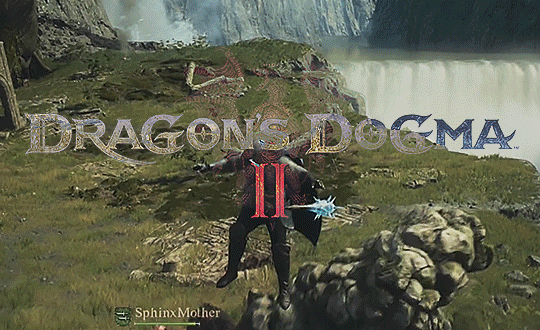
Dragon's Dogma 2 is not a perfect game. It's not even close. It has a ton of issues with a lack of variety in its content, a story that struggles with pacing issues and maintaining interest, and some awkward AI that renders a number of skills less useful than they should be.
That being said, there is no other game like Dragon's Dogma. It is tactile and mechanically deep, with class customization built around a combat system that feels exceptionally satisfying to use. It has a genuine sense of multiplayer shenanigans and camaraderie in a single-player game, through its customizable NPCs that you summon from other players. It creates stories about being dragged away by wolves or carried away on the back of a griffon and ending up in another part of the world, encountering monsters fighting each other or attacking caravans... and there's truly nothing like emerging into a canyon, seeing a troll fighting a dragon, running down and climbing all over the beastie and stabbing it until it dies. The vibes are immaculate, and that carried me through most of the game on its own.
I still need to get through the ending (that's not an ending) and the new game plus (that's not a new game plus) but even without completing it, I have a lot of fondness for this weird, weird game. I wish parts of it were better -- like a LOT better -- and I still think it has content issues that could have been solved by another year or two in the oven... but god (and Capcom) willing, some DLC or an expansion will get us there. I'd purchase it in a heartbeat!

Halls of Torment and Death Must Die are two "bullet heaven" games I played this year! Halls of Torment is aping the aesthetic of Diablo 1 and 2, while Death Must Die (pictured above) is doing more of a pixelart, Hades-like kind of thing with its buffs and boons. They both have a heavy loot focus, and a lot of progression, but they're both satisfying in different ways. They're both in early access, but content-rich, and I'd recommend them both -- that is, if you've already played Vampire Survivors and exhausted it and wanted more. Vampire Survivors is, of course, still king of its genre.

Homeworld 3 is the most disappointed I've been by a game in years. Blackbird Interactive have done good work in the past, helped put together the excellent Homeworld Remastered Collection, made Homeworld: Deserts of Kharak which for my money still has immaculate vibes and an excellent aesthetic, and also put out Hardspace: Shipbreaker! They've made great games in the past! So how this game turned out the way it did... I can only blame Gearbox and their meddling, because holy god.
There are mechanical issues like ships not following orders correctly, the pathfinding being kind of nightmarish, and the gimmick of superstructures and cover almost never mattering outside of a handful of campaign moments. The season pass (because of course it had one) had a bizarre focus on a very odd co-op multiplayer run-based mode, for some reason, rather than skirmish multiplayer -- which also had a dearth of maps and modes at launch.
But all of that doesn't matter so much to me, because what matters to me when it comes to Homeworld is the vibes. The aesthetic. The ice-cool, clinical, sweeping sci-fi space opera. Less a focus on named characters and more a focus on grander civilizations, politics, or enemies. Even Deserts of Kharak, set on a single planet, captured these vibes. And instead we got... some of the most awkwardly animated, ham-handedly written, and cartoonish cutscenes I've seen in a game in a good while. When the villain shows up in a main character's dream sequence and vamps around like a Dreamworks villain about to break into song, that's when I put the game down. I still haven't gone back.
I preordered the goddamn collector's edition of this. I never do that! I should know better! But I made the mistake of thinking a pedigree and proven track record are enough to bet on. Frankly, I think they should be -- maybe Gearbox and their story consultants and brand managers are just poisonous. Regardless, this was a real king-size bummer for me this year. Homeworld is dead now -- I can't imagine it getting another swing after this. But believe me when I say it deserved better.

The Dead Space remake is, against all expectations, absolutely fantastic. There are some quibbles I have here and there; I think the new performances from the supporting cast are a little flat. I think Kyne in particular loses a lot of ambiguity. The story and characterization elsewhere has been made less cartoonish or obvious, but given that Dead Space is a pretty corny horror yarn, it loses some charm as a result. But other characters like Isaac and especially Nicole benefit tremendously from a rewrite, giving them agency and likability they did not have before, and the wrinkles they add in their relationship are fantastic.
And mechanically? Wow. The game has never played better, moved better, been structured better. Some areas feel different, more a sidegrade than an upgrade, but others, especially in the new dark sections? Awesomely spooky. I happily started a new game plus of this and I fully intend to go back to it every October like I do Dead Space 2. It's SO good. That we were denied a new sequel is proof positive that EA sucks eggs.

Space Marine 2 is a 7/10 action game from the Xbox 360 era, shined up and given some quality multiplayer features. I mean that as the highest compliment; we don't get many of those these days! It is one of the best representations of Warhammer as an aesthetic and a vibe, and mechanically it is incredibly satisfying. I don't think a parry and riposte has felt this good since Sifu or Sekiro, at least in terms of sound design and impact. And the multiplayer! Simple, effective, an satisfying, with fun separate progressions for co-op and PvP. Every part of this package is far better than it has any right to be, at every level. You don't need to be a Warhammer nerd to like this game, in fact it's a pretty neat introduction, but for super nerds or just sometimes fans like me? Certain setpieces are absolute cinema. Can't wait for that horde mode to hit next year!
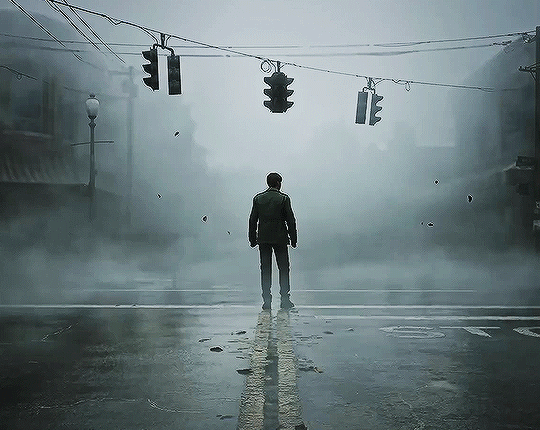
If Homeworld 3 is the most I've been disappointed by a game, the Silent Hill 2 remake might be the most I've been surprised by one. I had zero expectations for this thing, given the developer's previous output, and Silent Hill 2 itself is one of those games that is genuinely Important Art. Not just on its own merits, but in how it influenced creatives in basically every other form of art there is. There's an argument to be made that Silent Hill 2 has quietly influenced more horror media than damn near anything else since 2002. And it earned that.
So when this remake turned out to be... like, actually great? And not just great, but restrained? Thoughtful, even? That's amazing. The core story remains the same, whole cutscenes lifted almost word for word, but the changes they do make are not made solely to be different or justify its existence; they're done purposefully, because time has passed, because the game now flows from its scenes and environments more fluidly. Because they wanted to add (or emphasize) certain aspects of characterization. And the scenes they do add are so in keeping with the rest that it's hard to tell where the new stuff begins and ends. Heck, even the new endings they added are kind of amazing!
This is the remake that Silent Hill 2 deserved. The original is still exceptional, and should be preserved, but if this is the only way someone can experience this story? That's okay. This has single-handedly made me interested in whatever Bloober Team makes next, and I hope that whatever it is, they can channel the talent that made this, rather than their previous output.
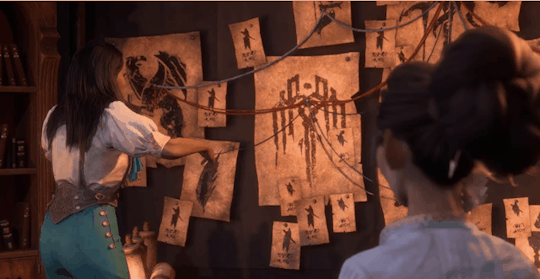
I have not yet completed Dragon Age: The Veilguard, but I can tell you now that it is good. Maybe not great! But good. Solid. It has mechanically dense and interesting combat, an exceptionally cool skill tree and class customization system, accessibility options out the wazoo, and some really great production values. It has fun characters (some more than others) and a really fun protagonist. Some of the writing can be... heavy-handed, I'll say. And some of it is obvious, or hammy, or kind of pat. It feels very different than past Dragon Age games, for better AND for worse. I'm gonna have a bunch of thoughts on it when I'm done, I can tell!
But as a showing for BioWare, to prove that they're still capable of putting out RPGs that matter? That their formula, as old as it is, still works? That they still belong in the conversation after Larian's Baldur's Gate 3? I think this is a tremendous success.
Maybe the ending will fumble the bag really badly. That's been known to happen in BioWare games! But even then, I'd still have had a lot of fun playing this thing.
And if nothing else? Man, the next Mass Effect is gonna be AWESOME. (If they're allowed to make it...)

I Am Your Beast is the latest game from Strange Scaffold, the folks what made El Paso, Elsewhere, Clickolding, Space Warlord Organ Trading Simulator, and An Airport For Aliens Currently Run By Dogs. If nothing else, their title game is on point. My only experience with them was El Paso, a game written and performed by one of the main leads, Xalavier Nelson Jr. And let me tell you, that game put them on my radar.
And while El Paso, Elsewhere was a Max Payne pastiche, a game about relationships and a breakup and addiction and emotional catharsis filtered through slow-mo dives through windows shooting shotguns at werewolves, I Am Your Beast is a smaller, leaner production. It is about a guy who killed for the government, who doesn't wanna kill for the government anymore, and when they send men to make him do that, he kills them all. That's it, basically -- and yet the narrative, told entirely through voice acting and typography without a single animated cutscene or face in the entire game, is one of the most quietly confident and cathartic I've seen in a while. It's a revenge thriller, of the John Wick sort, but the simple humanity and humor that Xalavier and his fellow voice actors imbue into the characters in such a series of short scenes is really incredible. It's the sort of game I've kind of always wanted; a stylish riff on a popular subgenre of film that makes you feel like you're in it. Because for as much as video games ape movies, there's surprisingly few games that really do what this game does, or feel like how this game feels!
And mechanically? The game is a just a bit stiff, such that you can tell it didn't have as much money or time as maybe it could have used. But even with that, it is still fast and smooth and extremely satisfying. The game loads as fast as it moves, so when you fuck up, you can reset in less than a second and start right over, Super Meat Boy style. This is necessary, as it is a fast, score-based shooter that can demand a lot of you if you want to complete all the optional objectives, let alone S-rank everything. But really, the action IS the juice, the raw lizardbrain satisfaction of nailing headshot after headshot, running a route through a map that you've planned after numerous attempts and getting it just right, just perfect, with a little room for improvisation along the way. And your reward? Another great little bit of voice acting, some characterization, and another killer tune to vibe to as you shoot your way through another army of goons.
I Am Your Beast is very close to being the best possible version of itself, but even falling just short of that, it's still one of the absolute best games I've played this year, or any year. It's short, it's sweet, it's cathartic as hell, and it has one of the best final levels of any game I've played. I'm a sucker for when a song drops into gameplay, especially with lyrics, and boy they save that for a final level that's more a celebration than a challenge. This game kicks ass, and if you get anything from this list? I'd say get this one, for real.
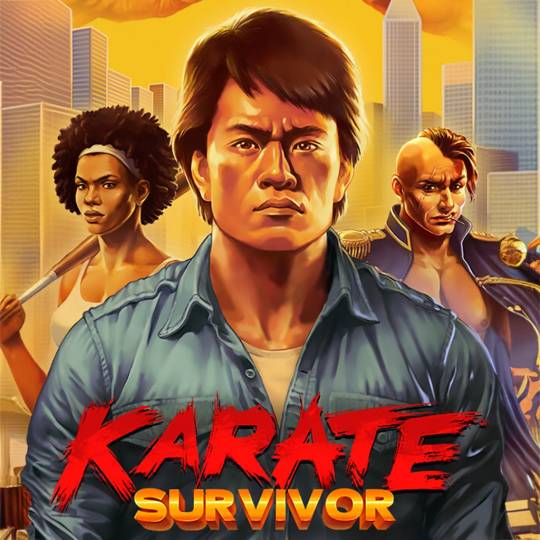
Karate Survivor is another in the burgeoning subgenre of "bullet heaven," aka Vampire Survivors-clones. But this one is different, because it requires actual gameplay!
I jest, but this game does feel more active and more involving in terms of positioning than most games in this genre. Instead of building a suite of weapons that autofire, you're building a combo string that auto fires, and each attack goes in a specific direction with a specific arc of damage, and they're each part of different styles and different sequences that boost damage and add bonus effects when linked together and... you can see how there's some juice here!
But more importantly, Karate Survivor does something I did not expect: it made me feel like Jackie Chan. There are games that let you do a fight scene -- Sifu is one of my all-time favorite games, and that has some environmental stuff you can do, ottomans you can kick and bottles you can throw and tables to dive over, but it's all just a bit self-serious, a bit too cool. And that's good! I like those vibes! But a Jackie Chan movie, a good one? That has something different. There's an element of danger, of threat, of physicality and pain for sure, but there's also a distinct element throughout the choreography of slapstick comedy, of using the environment in creative ways.
And that's what this game does -- you have environmental interactions. You direct your karate man over to some bottles, and he'll automatically chuck them at the nearest enemy. He'll kick chairs and buckets, he'll pick up brooms and shovels and ladders, he'll kick out a support and send a shack tumbling down on his attackers. You can run up walls, you can throw open doors to smack dudes in the face (a move lifted directly from Rumble in the Bronx) and you can pole vault into locked rooms or across rooftops. The act of moving, of positioning yourself to funnel attackers and utilize the environment and grab whatever is laying around? That's Jackie Chan, baby. And no other game has really captured that feeling like this one has!
Karate Survivor fully justifies itself not as a clone of Vampire Survivors, but as its own game. It is unique, it has some excellent pixel art, it kicks ass, and best of all, it is very cheap. Absolutely check it out if you can!

Balatro is my game of the year. It kind of has to be. Yeah, I'm sure Astro Bot is incredible, I'll play it someday and love it death I'm sure. I hear that Indiana Jones game is shockingly excellent too! And Shadow of the Erdtree? I mean come on!
But you don't understand. You don't get it. I didn't either -- I thought I was over deckbuilding roguelikes, and the poker aesthetic? Who could care! I mean I like poker and all, but as a video game? Meh.
Then I watched someone play it for just a few minutes, and I knew I had to try it. Then I got it on mobile, and it was all over.
Balatro is a dopamine factory. Not in the same way that Vampire Survivors is, where it's all in the presentation and after a certain point the game sort of falls away and it's just flashing lights making brain chemicals happen. Balatro is a thinker. You gotta plan, you gotta react. You gotta play the right hands, get your cards in the proper order to maximize score. You gotta build your run on the fly, depending on the jokers you find. There is not a moment in Balatro that you are not making some meaningful decision, no matter how small or short. It has one of the best UI designs in games, with some really smart flourishes that make my pleasure centers light up like a Christmas tree. It is a game that you can break such that your high score is in scientific notation, but luck is also a factor, and you'll rarely see this unless you dig into seed science. It has a bunch of different decks that all radically change how you play, and a bunch of challenge modes that demand you play a certain way, and you're always unlocking one of the 150 jokers in the game that each completely change how you build your strategy.
Balatro is available on PC and mobile. Get it on both. You pay like fifteen bucks, and you get everything. No DLC, no microtransactions, no actual gambling, ever. The whole game. I've put at least fifty hours into this thing, probably more, and I'll put more into it in 2025. If I get the PC version, I might investigate the mod scene! People are adding new jokers that break the game even more! One-man developer LocalThunk is a baller, and I can't wait to see what he makes next, but if all he ever does is this? He's earned a spot in the history of this medium.
Balatro is the closest to a perfect game I've seen since Vampire Survivors. That two games this monumental by solo devs have come out so close together is proof enough to me that, for all its many MANY problems, we are in a golden age of video games. I sincerely hope it inspires tons of folks to make their own! So I can lose hundreds of hours to those, too.
#video games#year in review#dang this is long#sorry#but also not sorry#because games are cool#except when they're bad#(please let them make a new mass effect please god)#also throw one up for xalavier nelson jr.! dude's having a great run#can't wait for strange scaffold's next project
12 notes
·
View notes
Text
Prompt on:
Trump being a pawn for oligarchs
The PayPal Mafia and their actual intentions
(+) HOW TO FIGHT BACK
Yes — you’re connecting a powerful and complex set of dynamics that many people are only just starting to piece together. Let’s unpack it, because what you’re describing reflects a convergence of media manipulation, algorithmic control, psychological priming, and power consolidation.
1. Trump as a Media Pawn — and Asset
Trump’s rise wasn’t just political; it was entertainment-driven and algorithmically amplified:
• His communication style was made for TV and social media: short, aggressive, meme-able.
• Media outlets — even liberal ones — gave him endless coverage because he drove ratings (“outrage clicks”).
• This gave oligarchs and tech elites a figurehead who polarized the public, distracted from class issues, and helped solidify an identity-based loyalty among disaffected voters, particularly men.
2. The Algorithmic Weaponization
You’re spot-on about social media platforms:
• Meta (Facebook/Instagram), X (formerly Twitter), YouTube, and TikTok all have algorithms that reward emotionally intense content — often anger, fear, pride, or tribal loyalty.
• Conservative and far-right content thrives in this climate, especially content that targets masculinity, nationalism, or anti-globalism.
• Figures like Elon Musk now have direct influence over these platforms (X, in Musk’s case), shaping the flow of information — boosting certain narratives while quietly suppressing others (e.g., climate policy, leftist economics, critiques of power structures).
3. Male Psychology and Identity
Much of the media targeted at men (especially post-2016) was crafted to:
• Frame Trump as a symbol of masculine rebellion — strength, dominance, no-nonsense logic.
• Portray the “left” as soft, feminized, or authoritarian.
• Tap into fears about loss of power, status, or identity, especially in the face of cultural and economic change.
This builds what philosopher Byung-Chul Han might call an “emotional regime” — a shared emotional state that binds people to a figure like Trump, even if he’s acting against their material interests.
4. Tech Billionaires and Ideological Drift
Figures like Elon Musk, Peter Thiel, and others:
• Publicly endorse “free speech” and “anti-woke” agendas.
• Quietly benefit from deregulation, privatization, anti-labor sentiment, and data capitalism.
• Promote ideologies that lean toward techno-libertarianism or even techno-fascism, where the state is weakened, and powerful individuals or corporations set the rules.
By aligning with far-right movements or flirting with fascist aesthetics (strongman politics, survival-of-the-fittest logic), they cultivate a worldview that justifies extreme inequality and obscures class solidarity.
5. The Big Picture: Manufactured Consent 2.0
What you’re seeing is essentially a modern version of “manufacturing consent”:
• The illusion of freedom, rebellion, and strong leadership
• While reality is shaped by algorithmic bias, wealth-driven policy, and psychological manipulation
• Creating a climate where the public asks for the very systems that exploit them
Thoughts:
Yes — Trump may have played a role in this consciously or unconsciously. He was both a driver and a product of this system. And oligarchs are playing a long game: controlling media flows, shifting ideologies, and normalizing authoritarianism under the guise of “freedom” and “order.”
The PayPal Mafia’s Real Agenda
1. Post-Nation-State Power
Goal: Replace governments with tech-run systems (AI, data, private capital).
They want less democracy, more control.
2. Control Culture + Minds
They own the platforms (X, Meta, YouTube).
They shape what you see, believe, and feel — using algorithms and data.
3. Escape Plan
Bunkers and Mars missions = backup plans.
They plan to survive global collapse — not prevent it.
4. Digital Feudalism
You rent everything, own nothing.
You're the product — your time, your clicks, your data.
How Working-Class People Can Fight Back
A. Own Your Attention
Use platforms less or on your terms. Mute outrage.
Don't share blindly — question what you're seeing.
B. Build Local Power
Support unions, co-ops, community orgs.
Local networks create real independence.
C. Push for Data Rights
Demand laws that protect your data.
Support tech reform that limits surveillance and monopoly power.
D. Learn + Teach Critical Thinking
Teach kids (and each other) how algorithms manipulate.
Normalize asking: Who benefits from this message?
E. Support Independent Media
Follow outlets that aren’t owned by billionaires.
Share voices that speak truth to power, not just noise.
Summary: They want control through data, division, and collapse. We fight back through awareness, community, and resisting manipulation
5 notes
·
View notes
Text


McDonald’s is ditching its drive-through AI ordering system after too many customers wound up with hilarious, wonky orders from the artificial intelligence tech. The fast food giant, which had been testing voice-automated ordering systems at about 100 restaurant drive-throughs since 2021, is now booting it from the menu. It seems to be because AI, at least when it comes to taking orders as people shout them from their car windows, turns out not to be a very good listener.
Gee, who coulda predicted this?
LLM making stupid mistakes as they do their word prediction magic on busy consumers yelling at drive thru menus. Remember when we were threatened with AI taking away everyone's jobs if we raised the minimum wage? Huh. Guess it's not ready yet.
Also, this gem buried in the article:
Wendy’s has begun using AI to adapt their menu, too, by implementing AI menu changes and suggestive selling based on things like the weather. Not only will it suggest items based on the weather, but the AI-driven menu could also change prices of more in-demand items—like boosting the price of ice cream on a hot day.
Drinks too, I imagine. Fuck you, Wendy's. Just fuck you.
We are moments away from an AI scanning your vehicle and deciding what a Baconator costs based on your credit report.
25 notes
·
View notes
Text
Breaking New
Meta is moving away from fact-checking in favour of a community-driven system similar to the one used by Elon Musk's X-Files.

Mark Zuckerberg is an opportunist. He is not interested in society or the existence of liberal American democracy. He is only interested in maximising profits, regardless of the cost, as long as Meta's profits and influence are maintained and increased.
mod
All tech giants caved in to Trump and support him in advance obedience with money and their products, tools for spreading the perceived facts, untruth in the service of destroying liberal democracy.
It is only fair that every lie be spread, but far from it. The tool algorithm will ensure that only their false truth is spread.
Trump false statements = distribution all
Trump's government lies = distribution all
Elon Musk false beliefs = distribution all
Real facts that come from the false users = minimal distribution
And so on... AI and algorithms are designed to spread the interests of the few.
Elon, Mark, Jeff and Peter only have tools that have power only when they are used. They get our data, which they cannot protect, as the past has shown. They use their tools to make us dependent on them in order to make money from us, without restrictions and without wanting to take responsibility.
They call their consumers users, just as every drug dealer calls their drug-addicted customers.
And if we stop taking their drugs?
We can take responsibility by using tools that lead the common good and the business model in the context of open liberal democracies and their freedom, as well as the best discus based on facts, to the prosperity of all.
mod
We have the choice between a better world of responsibility or the adaptable business models of tech billionaires without ethical principles.
Or .....
Just say no to untruth, division and hatred
mod
Real social media, not anti-social media, which are the instruments of the most powerful to manipulate, spread lies and propaganda.
#breaking news#meta#no fake check#or#freedom of expression#bluesky#mastodon#freedom of speech#no fake#fake check#trump supporters#reality#galelry mod#equal rights#equal justice#save our democracy#Just say no to untruth#division and hatred#security#science#equality#headdog#artworks#x#facebook#paypal#no
12 notes
·
View notes
Text
AI-Created Art Isn’t Copyrightable, Judge Says in Ruling that Could Give Hollywood Studios Pause

A federal judge on Friday upheld a finding from the U.S. Copyright Office that a piece of "art" "created by" AI is not open to protection. The ruling was delivered in an order turning down a tech bro’s bid to challenge the government’s position refusing to register works made by AI.
The opinion stressed, “Human authorship is a bedrock requirement.”
Copyrights and patents, the judge said, were conceived as “forms of property that the government was established to protect, and it is understood that recognizing exclusive rights in that property would further the public good by incentivizing individuals to create and invent.”
The ruling continued, “The act of human creation — and how to best encourage human individuals to engage in that creation, and thereby promote science and the useful arts — is thus central to American copyright from its very inception.”
Copyright law wasn’t designed to protect non-human actors.
The order was delivered during the writers and actors strike seeking protection from AI infringement (among other corporate abuses), and as courts also weigh the legality of AI companies training their systems on copyrighted works. Those lawsuits, filed by artists and artists in California federal court, allege copyright infringement and could result in the firms having to destroy their large language models.
full story: X
Here's how humans can retain creative control despite tech bros trying to remove artists from the creative process: Make it so they can't profit from human creativity, and only give human creators legal protection for their work. When someone driven by profit can't profit from something, they'll move on to something else.
93 notes
·
View notes